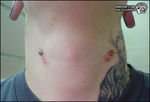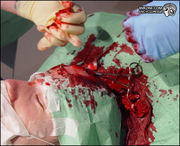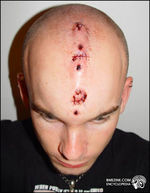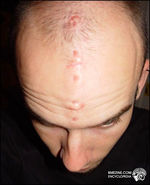Transdermal Implant Removal
Even more so than "normal" Implant Removal, getting Transdermal Implants out is much more difficult than getting them in, and because of the common problems in healing them, implant removal is often needed (or at least tolerating a far-from ideal healing, or wearing a jewelry design that covers up the problems). The hollow-lobed design of the implant, while good at anchoring it in place, also makes it quite invasive to take out.
Removal can require anything from the simplest (basically the implant procedure in reverse with a couple extra steps — make an incision in the original location, elevate the implant, excise it from the surrounding tissue, and pull it out) to massive incisions covering the length of the implant or implant series coupled with excision. If there are problems with deep transdermal placement, removal can be far more problematic.
Depending on how the implants were removed, basic suturing or wound closure will be required, or in a worst case scenario (barring something really serious like an inward travelling infection which can also require reconstruction of underlying tissue), a long series of closure.
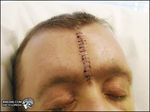 Problematic (Deep Transdermal Placement removal, fresh. |
Typically the scars will be quite prominent for the first few months, and settle down over the next few years depending on the individual. Below are two examples that match the procedures I have shown above:
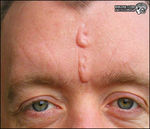 Problematic (Deep Transdermal Placement removal, healed. |
All in all, because of the low success rate and complications, transdermal implants are one of the few procedures that BME recommends against — although we fully support people's right to get them, if and only if they fully understand and accept the risks. It should also be noted that a variety of professionals are trying to solve the problems with transdermal implants.
